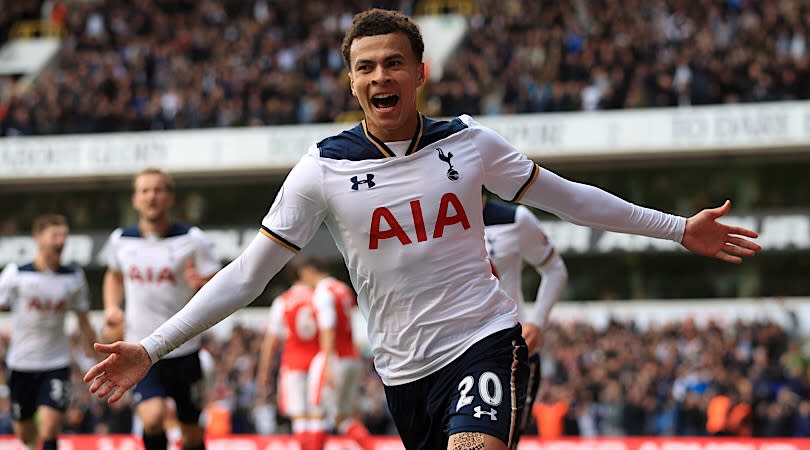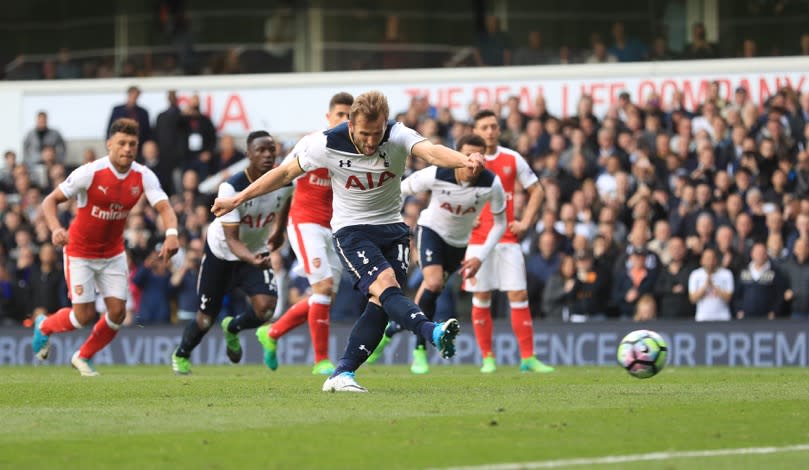Tottenham 2 Arsenal 0: Three observations from the North London derby
White Hart Lane only had one more derby to give. It’s frail now, ready to go. Tottenham against Arsenal has always bubbled with something visceral and the stands have stood up to that pressure for over a century. But the old ground is swaying now: dwarfed by the superstructure rising over its perimeter and fractured in the north-east corner.
The supporters who gather might have an insatiable appetite for this rivalry, but White Hart Lane’s bones are beginning to creak.
It’s just time.
The subtext was fitting. Arsenal arrived here with a proud record under threat: for 22 years they’ve finished above their local rivals and each season their cackles have grown louder and more contemptuous. Today, Spurs had the chance to end that sequence and, importantly, to apply that full stop while White Hart Lane is still alive to see it. Before the wrecking ball comes in, the ghosts have to go. This was an exorcism of sorts.
Modern football has convinced us that the contemporary player is unfeeling and detached, but while that may be largely true, derbies still hold an intoxicating power. In the early stages, both sides were all adrenalin and bluster. Spurs, working with a back four and Eric Dier in a bolstered midfield, ran hard in the opening minutes, pressing Arsenal deep in their own half and restricting their time in possession. Arsene Wenger’s side, in their newly customary back three, initially dealt well with the pressure, working the ball out of defence and presenting just enough theoretical menace to draw the heat from the occasion. Toby Alderweireld headed an early corner wide, a deflected Harry Kane drive drifted above and beyond the far post, and Alexis Sanchez, periodically pirouetting out of his own shadow down the right, flashed with vague intent.
Arsenal's new formation is yet to settle
If there was a recurring theme, though, it was Arsenal’s mismanagement of their own formation. Wenger’s rejig has been successful in hiding certain weaknesses but, after just two weeks of development, its ratios are still slightly askew. While the middle of the pitch remained congested and relatively secure, Tottenham broke quickly into counter-attacking situations several times in the first half, although ultimately with little joy. It’s a shape which suits Arsenal’s players, regularly placing their most dangerous attacking pieces in dangerous situations, but it’s one which also opens inconvenient pockets of space and makes turnovers in possession potentially critical.
Half-time came and went without any effect on the game’s pattern. That was to quickly change, though, in a sequence which has become emblematic of Spurs’s late season form. First, Christian Eriksen waltzed into the penalty area and, when his shot was blocked by Petr Cech, Dele Alli was well placed to prod the ball home. 1-0, with White Hart Lane bursting at the seams.
Then, three minutes later, Kane and Gabriel collided in the penalt box, Michael Oliver flinched... for effect… before pointing to the spot. 2-0, with Kane thumping into the bottom corner.
Spurs have mastered the one-two punch
If there was no pattern to the first goal, there certainly was to the second: Tottenham do this. Time and again since the turn of the year, leads have been built then quickly doubled. It’s happened so many times that it must be a coaching emphasis and, given the effect of those combination punches on Arsenal, rightly so. From being broadly competitive, Wenger’s side began to collapse in on itself: a strong appeal for a second penalty (following suspicions of handball against Alexis Sanchez) was turned away, before a rasping Jan Vertonghen drive drew a splendid save from Cech. Ten minutes later, another quick turnover bred another chance: Victor Wanyama stole an errant pass, galloped forward to feed Kane, but Cech - again - smothered brilliantly.
Pochettino's players now have the shoulders to be successful
There’s a broader point to be made here, because Tottenham have been here before. In previous years, particularly under Harry Redknapp, they’ve carried similar form into this sort of fixture and been rightly considered favourites against Arsenal. Typically, however, the derby - and the weight of its associations - has punctured their self belief, leaving them with only incomplete performances and regrets.
This was different. As those final minutes ticked down on White Hart Lane’s north London history, the shots continued to rain down on Cech’s goal and, in every area of their pitch, there was another symbol of Tottenham dominance; Arsenal’s creators twisted and turned, but found only banks of energised Lilywhite. The visitors were outrun, outworked, and outplayed and the longer the game went on the more that inferiority showed. Whereas his predecessors’ teams often seemed afraid to cross the line in this kind of situation, Pochettino’s side relished the opportunity to finish Arsenal off. Rather than being inhibited by the approaching history, they were drawn towards it.
Maybe this was the most fitting way to close this chapter? Spurs have suffered at Arsenal’s hands so many times and had joy snatched away so cruelly in the past, that the relative ease of those final minutes was essentially a collective catharsis. Down from the steep stands came the celebrations and the schadenfreude, with the home fans basking in the light one more time before the sun sets on this ground.
Now, finally, it's over. The dragon is slayed, the ghosts are gone.

 Yahoo Sport
Yahoo Sport 









































